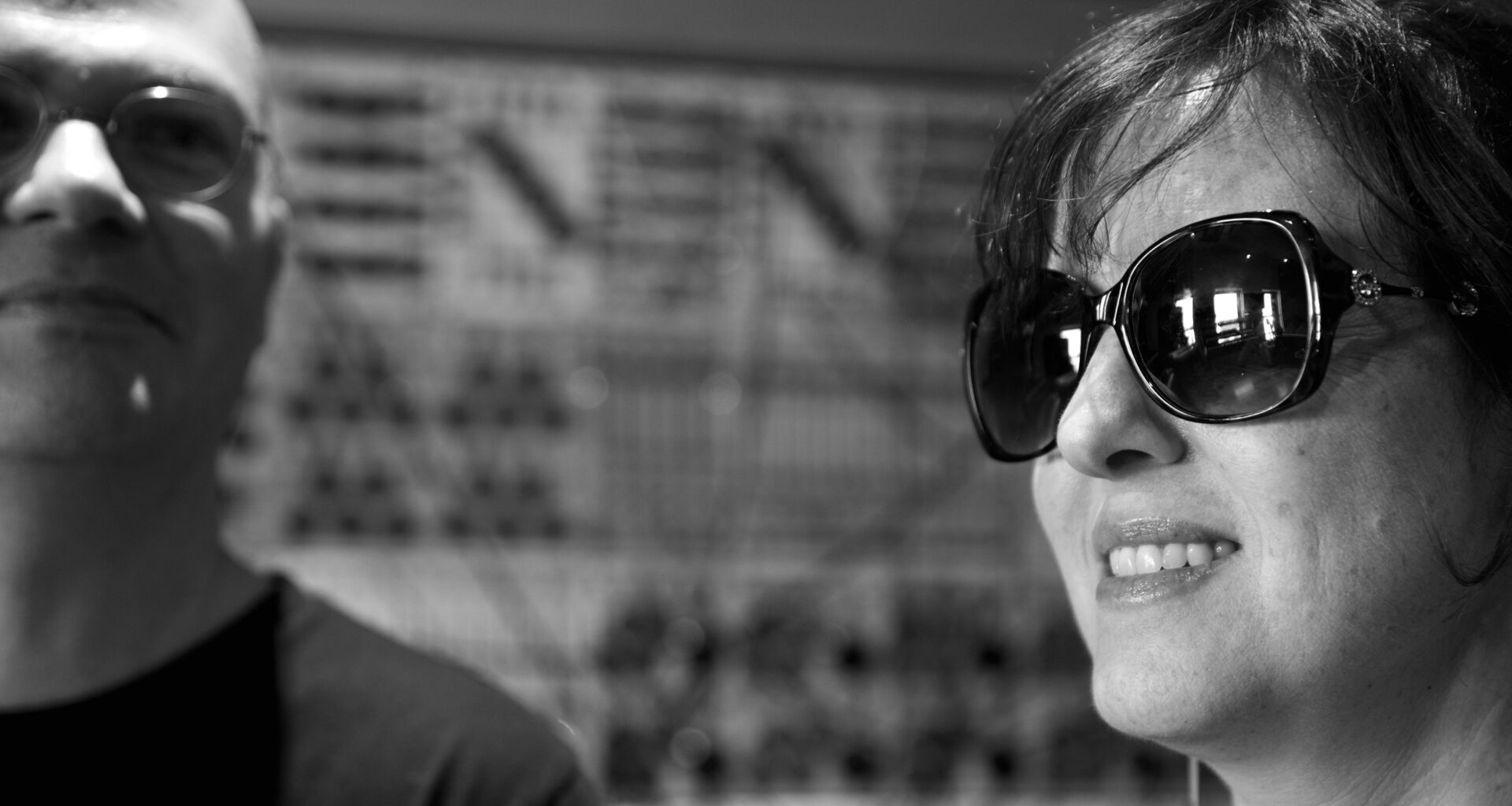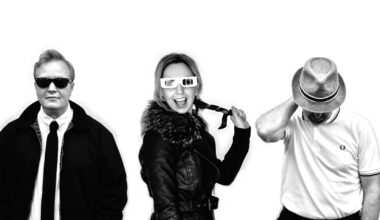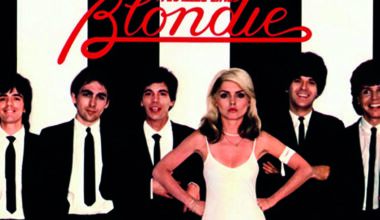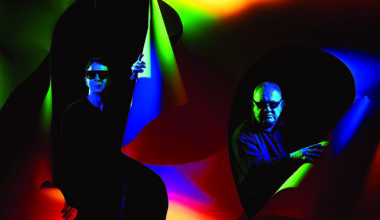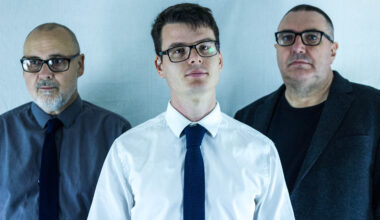An album of delicate synthpop? Just a female voice and a Buchla synth? Songs about space, washing machines, worms and electrons? Signed to Vince Clarke’s new record label? What’s not to like about Reed & Caroline?
“When I was a kid, maybe in second or third grade, I went to a party with my parents for this guy who had proposed we live in space colonies between the earth and the moon,” synth wizard Reed Hays recalls wistfully. “There were these artist’s renderings of what it would be like, with this centrifugal force thing, and these 1970s people having barbecues, drinking red wine in a space station. How can you not think about that?”
With folk singer Caroline Schutz, Hays is one half of electronica outfit Reed & Caroline, and this early, optimistic reminiscence says a lot about the man he is today. The latest signing to synthpop overlord Vince Clarke’s Very Records, Reed & Caroline present a benign view of machines and the future on their debut album, ‘Buchla & Singing’, a record composed entirely from sounds created on the infamous vintage Buchla synth and Caroline’s lucent voice.
Reed grew up in Huntsville, Alabama, known as The Rocket City for its close association with US space programme. Being surrounded by all things NASA couldn’t fail to fire his imagination. His fascination with space eventually gave way to an obsession with sounds that reminded him of space travel, and machines. All of which manifests itself in the retro-future charms of the album.
“The first electronic music I heard played on that space theme,” Reed says. “Because it sounds like other worlds, you’re creating a world from scratch and there’s something beautiful about that.”
In part, ‘Buchla & Singing’ nods to the 80s classics of electropop, as on the dance rhythms and pneumatic basslines of ‘Electrons’; in places it’s more downbeat and celestial in style, like on ‘Harmonic Generator’.
Everything is adorned with micro details that could be nothing but the Buchla – drones, blips, shimmers and effects that have a living, organic quality, impossible to achieve with any other machine. On ‘Henry The Worm’, the melodic sequence cascades, surges and sings; while on ‘Talking Blanket’, the machine “speaks” in off-world code, a weird electronic dialect that’s hypnotic when placed in counterpoint to the poppy simplicity of the lyrics and melodies.
“Everything coming out of a Buchla sounds somehow organic, a lot of that has to do with the envelope, and the amplifiers. You always recognise the sound. It’s different. You can’t play Van Halen’s ‘Jump’ on it,” Reed wisecracks.
The Buchla not only forms the bedrock of the new record, it’s also the catalyst that brought Reed & Caroline together. As a classical cello student, Reed applied to study at Ohio’s prestigious Oberlin college because he saw a Buchla in the college brochure and, having been captivated by records that employed the rare, heritage kit, such as Morton Subotnick’s ‘Silver Apples Of The Moon’, Reed wanted to try using it. There he met Caroline, who was studying art, and they became good friends, though only started to work together much later.
Caroline, a member of indie rock/folk groups Folksongs For The Afterlife and The Inner Banks, lives in California these days and was originally a graphic designer, but later gravitated to her greater passion, music. Though her own material is more acoustic in style, she admires many of the early innovators of electronica, and enjoys crafting her own synthetic sounds.
“I do love a lot of older electronic music,” Caroline remarks. “Experimental bands from the 60s and 70s like The United States Of America and Silver Apples. Those bands used very basic oscillators and ring modulators that they custom-built, to create a very psychedelic sound. A friend of Reed and mine lent me a Moog Source about 10 years ago and has yet to take it back, lucky for me. There are some beautiful, haunting sounds on there that you just cannot get with any other instrument. The same friend lent me a Roland SH-1, an early monophonic synthesiser capable of some really gritty, but otherworldly sounds. I have also been very interested in the concept of musical soundscapes, and analogue synths are an especially powerful tool in that regard.”
Though they share some common ground, Reed & Caroline’s approach to music is quite different. It’s this divergence of musical styles and interests that makes their collaboration work so well.
“Reed and I have been friends for a very long time and I always loved his music,” Caroline explains. “Part of the reason I love it is that it’s so different to mine, not just in instrumentation but in tone. My music has always been a little gritty and melancholic, while there’s something very clear, sunny and futuristic about Reed’s music. He’s always had a very unique aesthetic that hasn’t changed a lot over the years. I’m guessing that he really does spend a lot of time walking around thinking about NASA and electrons. So working together is like walking around inside his brain a bit, which is fun.”
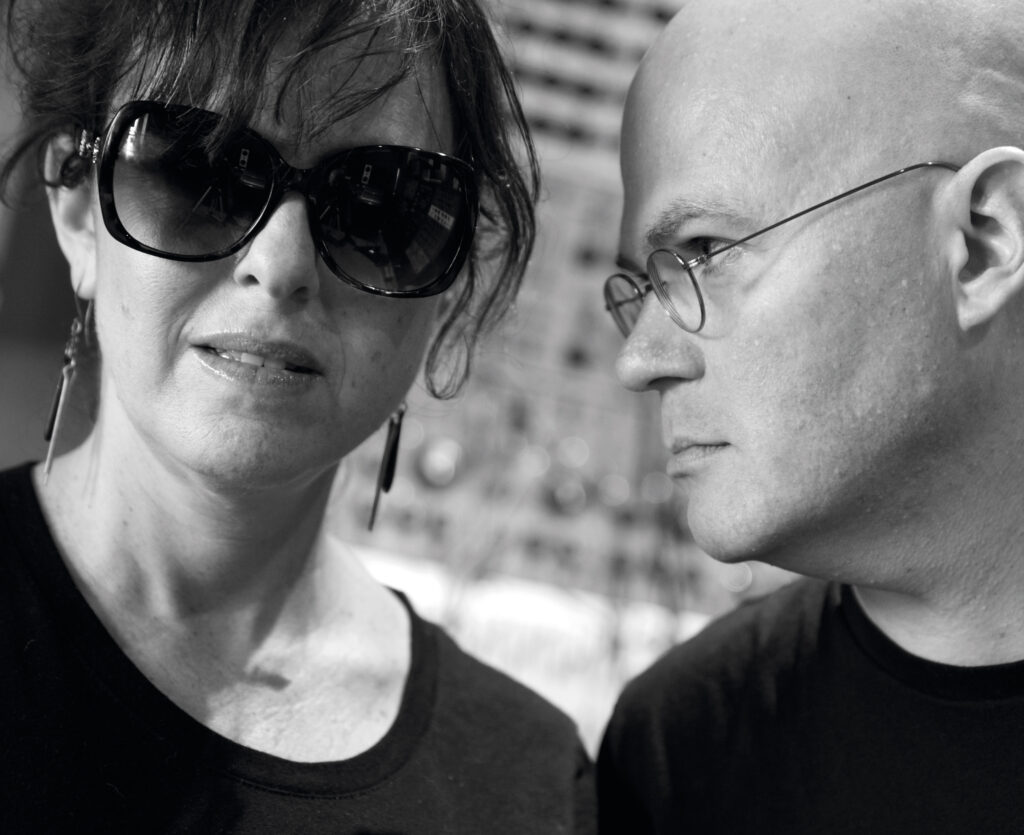
Another insight into Reed’s brain is the lyrics, all of which he writes himself. Celebrating the beauty and function of washing machines, seeing the world from a worm’s-eye view, becoming a raindrop or singing the praises of a harmonic generators all suggest a love of nature and technology, a consonance between organic matter and metal, much like the album itself.
“The first thing Vince said when I played him stuff was, ‘This is all very optimistic’,” Reed says. “I don’t know what that means, but it’s an ode to science. It’s funny, because I read a couple of interviews with Andy McCluskey saying that their songs were an ode to science, but everyone mistook them for love songs. What I’m doing can’t be mistaken for a boy meets girl thing, it’s really about washing machines and electrons!”
Having Vince Clarke – the man behind countless classics with Depeche Mode, Yazoo and Erasure – as a label boss is pretty much a dream come true for Reed & Caroline. Luck played a significant part, with Vince hearing their music through a mutual friend.
“He said, ‘This is great, I’m just starting a label, do you have more stuff like this?’. I said, ‘Yeah!’,” Reed recalls. “Of course, I had to scramble. I had a couple of months, and quickly wrote a bunch of other songs, and had Caroline come in and sing on them.”
Vince and the New York-based Reed have since become good friends, bonding over their nerdy love of synths.
“It’s great,” Reed grins. “We just talk about synths all the time. I was at lunch with him the other day and there was a lull in the conversation, and he just said, ‘I really like analogue sequencers’ and we were off again.”
Reed thinks he knows why Vince likes their music, too.
“We are almost the opposite of what Vince does. He’s always had these very dramatic singers, you know Alison Moyet, Andy Bell, they’re really belting and they complement his very interesting, but very simple synthesisers. I was trying to do something with a very simple vocal so all the little Buchla blips and blops could dance around that and the vocal would act as the foundation.”
The day after Electronic Sound spoke to Reed, we hear of Don Buchla’s sad passing. Buchla, the legendary Californian synth pioneer who gave his name to a series of innovative analogue synthesisers, and whose machines can be heard on many classics of electronic music, was a huge inspiration to Reed.
“I only spoke to him two or three times. He was a man of few words and long pauses,” Reed says. “Probably within those pauses his neurons were making connections in totally unique ways. Things I figured out how to do after years and years of playing with Buchla’s modules, he had probably thought of in an instant in the middle of a long pause at some point before I was even born.”
That Buchla’s exceptional musical machines live on, and are celebrated by artists like Reed & Caroline is a great credit to the man. On ‘Buchla & Singing’, Reed manages to tease all manner of sounds from the instrument, to the extent that it’s almost the living third member of the band. Listening to the record, it’s hard not to be captivated by its almost sentient nature.
“It’s your idea originally, but it’s the Buchla’s take, so it is a collaborator in that way,” Reed signs off.
Luckily, the legacy of Buchla’s incredible machine, and that of electronic music at its blissful, optimistic best, is safe in Reed & Caroline’s hands.
‘Buchla & Singing’ is out on Very Records
